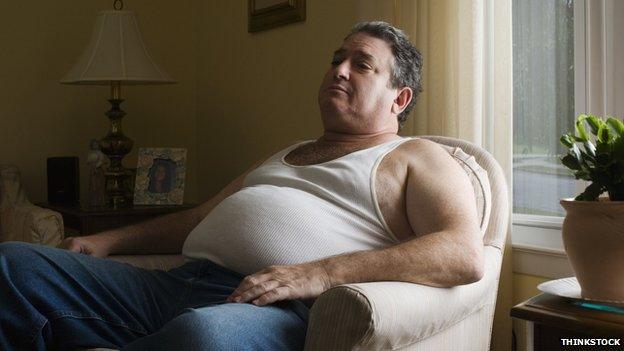Testosterone 'could prevent heart and diabetes deaths'
- Published

Boosting men's testosterone levels could potentially reduce deaths from heart disease and type 2 diabetes, UK doctors and scientists say.
A team in Sheffield has shown the sex hormone has a "major impact" on the way sugar and fat are handled by the body.
At the Endocrine Society's annual meeting, they said low testosterone was common in type 2 diabetes.
Experts said the field was being "turned upside down" as testosterone was previously considered a villain.
It was thought to explain why men are more prone to heart disease. There are also concerns about the damaging impact of testosterone, as seen in bodybuilders who abuse the hormone.
Fatty issue
Type 2 diabetes is often related to obesity. Piling on the pounds has a negative impact on testosterone as the fat launches a twin attack on the hormone.
It releases chemical signals to reduce production and it actively breaks down the hormone into oestrogen.
A fifth of people with type 2 have symptoms of low testosterone affecting mood, energy and sexual performance, the researchers said.
Dr Daniel Kelly, of the University of Sheffield, won the Endocrine Society's presidential award for the findings he presented at the conference.
He used testosterone-deficient mice to show that the hormone was heavily involved in how sugar and fat were processed.
With no testosterone, the liver and muscles were less able to take up sugar, and fat was diverted from under the skin to clog up the liver and arteries.

Health can be affected if testosterone levels are too high or too low
Dr Kelly told the BBC News website: "We know men with low testosterone are at greatly increased risk of type 2 diabetes and cardiovascular disease as well."
His findings start to explain why, as well as suggesting that hormone replacement therapy to restore testosterone to its normal level or "physiological window" could improve health.
"It's detrimental to have testosterone levels that are too low, but if we go above the physiological window then there are effects there as well, so it would require careful monitoring," Dr Kelly added.
Massive burden
Prof Hugh Jones, a consultant physician at Barnsley Hospital who was also involved in the work, describes diabetes as the "cancer of the 21st century" that is going to be a "massive" burden on healthcare systems.
He said: "What we're trying to show is that testosterone significantly affects the way sugars and fats are used within the body and has a positive effect when you return testosterone to normal.
"If studies do show that replacing testosterone to normal is safe, and that is key, then it would increase the lifespan of many men."
The research, however, missed out on half the population. No-one is contemplating testosterone therapy in women as it would lead to masculinisation.
How similar biological processes are controlled in women has not yet been uncovered, although a prominent role for oestrogen is suspected.
'Replacement therapy'
Prof Ashley Grossman, an endocrinologist at the University of Oxford, said: "We used to think that testosterone was one of the 'bad guys' and accounted for the adverse metabolic phenotype of men compared to women, and their tendency to more heart disease.
"Now the field is turned upside down as testosterone is seen to have majorly positive effects.
"However, there is a commercial push for older men to have testosterone replacement therapy, and there is some scepticism among clinicians that this is more financially rather than clinically driven.
"Nevertheless, these data do suggest that very low levels of testosterone in ageing males might not be good."
- Published28 April 2014

- Published4 February 2013

- Published12 September 2011
